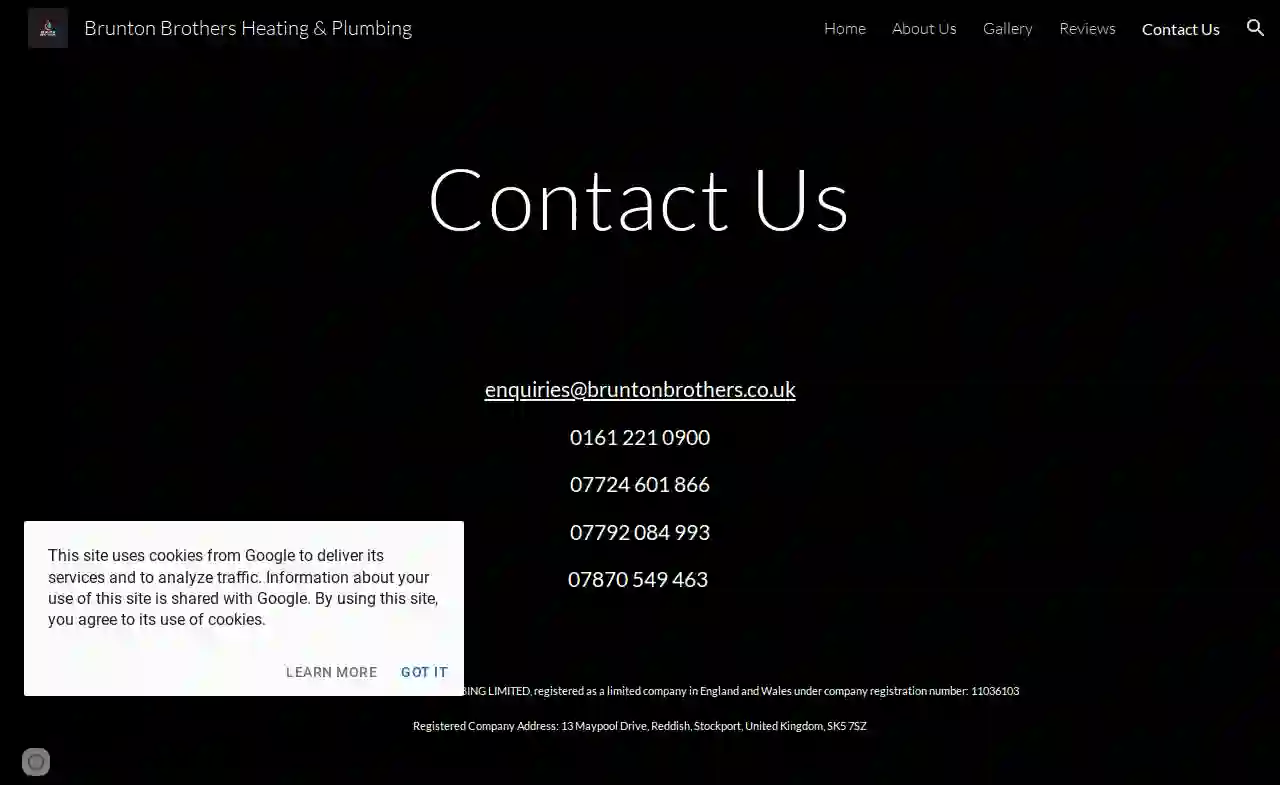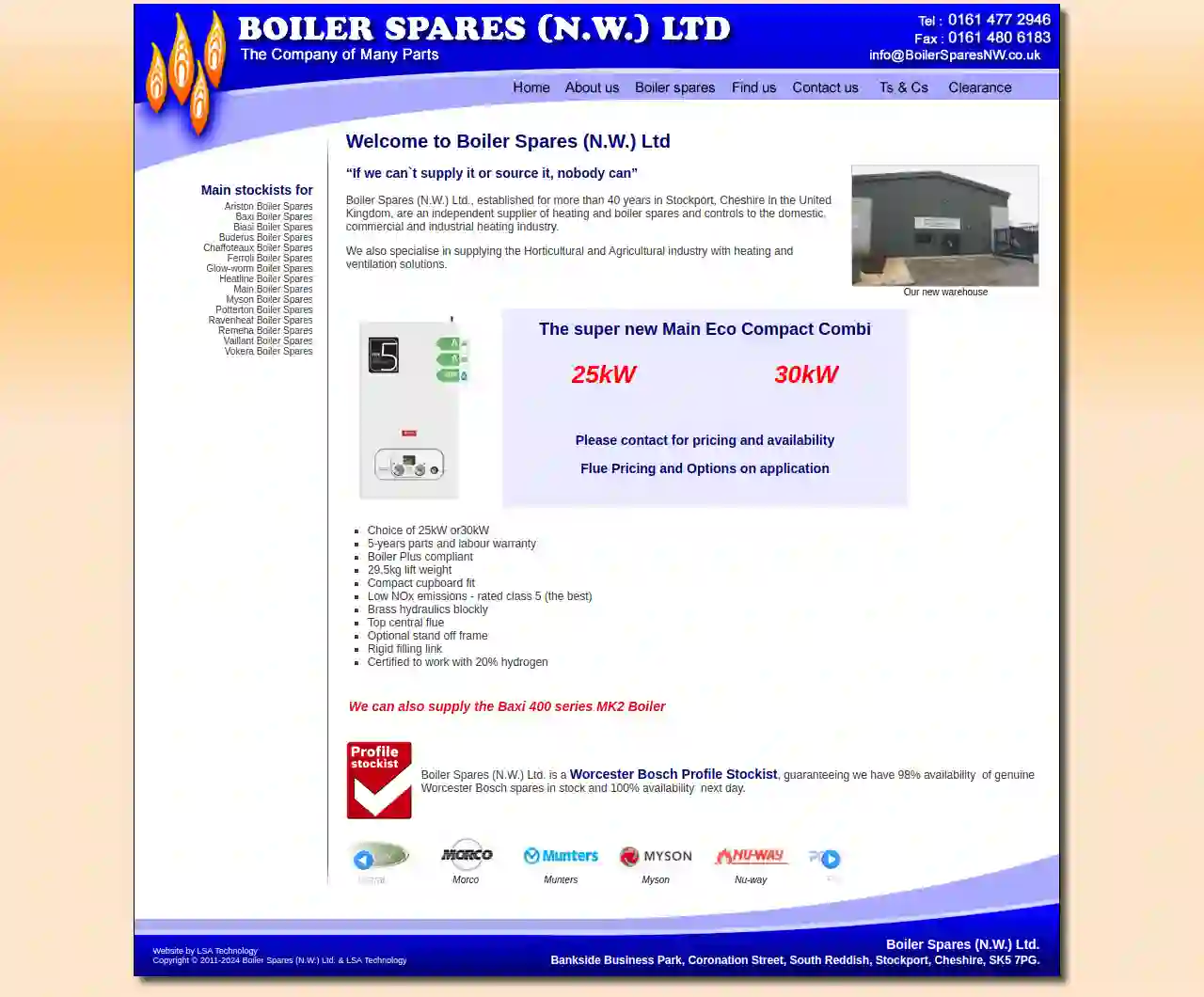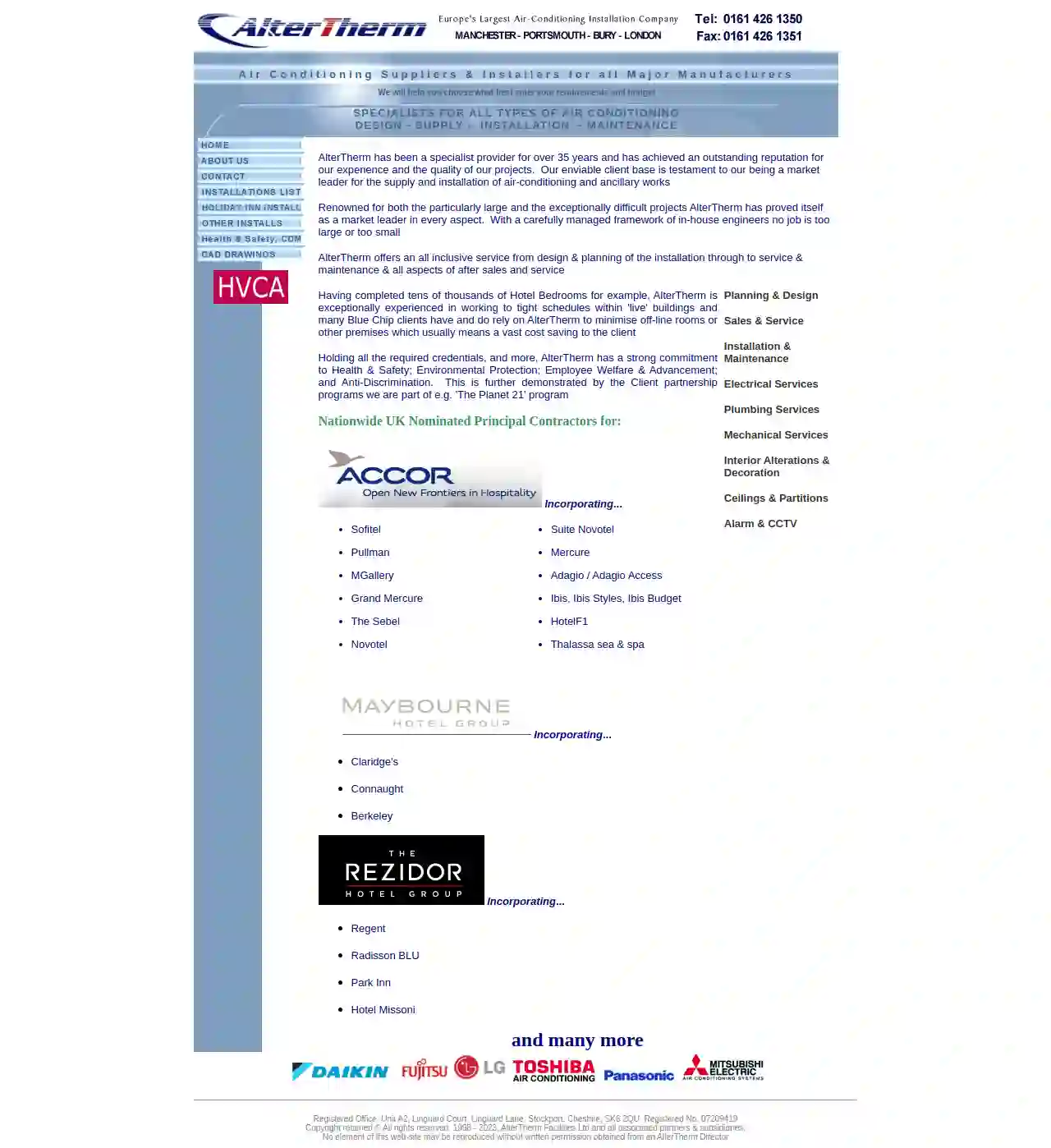Boiler Installation Hollinwood
Top 10 Boiler Replacement in Hollinwood
Get up to 3 New Boiler quotes for your project today! Compare profiles, reviews, accreditations, portfolio, etc... and choose the best deal.

Harry Taylor of Ashton Ltd
44 reviewsKitsons Works, Aylesbury Road, Kitsons WorksAylesbury Road, Bromley, BR2 0QZ, GBHarry Taylor of Ashton Ltd is a leading provider of industrial heating, cooling, and energy efficiency solutions. With a strong commitment to customer satisfaction and environmental responsibility, we offer a comprehensive range of services, including installation, maintenance, and repair. Our team of experienced engineers is dedicated to providing tailored solutions to meet the unique needs of each client. We serve a variety of industries, including manufacturing, warehousing, and leisure facilities. We are proud to be a Carbon Trust accredited company, demonstrating our commitment to reducing carbon emissions and promoting sustainable practices.
- Services
- Why Us?
- Accreditations
- Gallery
Get Quote
BRUNTON BROTHERS
13 Maypool Drive, Reddish, Stockport, GBAt Brunton Brothers Heating & Plumbing, we have over 25 years of experience in carrying out heating and plumbing work across the North West. Over the years we have gained an enviable reputation in the industry for delivering excellent customer service and providing workmanship of the highest standard. We specialise in all aspects of central heating, plumbing and bathroom installations and can undertake projects of all sizes. Whether you need assistance with boiler installations, boiler repairs or bathroom refits, as experienced professionals, we can help you with all of your requirements.
- Services
- Why Us?
- Our Team
- Testimonials
- Gallery
Get Quote
Boiler Spares N W Ltd
4.586 reviewsBankside Business Park, Coronation Street, Stockport, SK5 7PG, GBWelcome to Boiler Spares (N.W.) Ltd, established for more than 40 years in Stockport, Cheshire in the United Kingdom, are an independent supplier of heating and boiler spares and controls to the domestic, commercial and industrial heating industry. We also specialise in supplying the Horticultural and Agricultural industry with heating and ventilation solutions.
- Services
- Why Us?
- Gallery
Get Quote
RADA Plumbing Heating and Electrical
57 reviewsManchester, GB24/7 Manchester Plumbing Heating and Electrical services. Expertise in bathroom fitting, boiler repairs, and more. Your home comfort, our priority.
- Services
- Why Us?
- Testimonials
- Gallery
Get Quote
Heating Medics
512 reviews1000, Altrincham, M22 5AA, GBThe Heating Medics are a small, family-run business based in Greater Manchester, specializing in boiler installations and repairs. We pride ourselves on providing honest, upfront pricing and reliable service. Our team of skilled engineers are committed to delivering high-quality workmanship and exceeding customer expectations. We understand that your heating system is essential to your comfort and well-being, so we strive to provide prompt and efficient solutions to all your heating and plumbing needs. We offer a comprehensive range of services, including boiler installations, repairs, servicing, and plumbing work. We also provide landlord certificates and offer expert advice on all aspects of heating and plumbing. Our commitment to customer satisfaction is reflected in our many positive testimonials. We are dedicated to building long- Our Services We offer a comprehensive range of services, including: Boiler Installation: We install a wide range of boilers from leading manufacturers, ensuring a perfect fit for your home and budget. Boiler Repairs: Our experienced engineers can diagnose and repair any boiler issue, quickly and efficiently. Boiler Servicing: Regular boiler servicing is essential for maintaining efficiency and safety. We offer comprehensive servicing packages to keep your boiler in top condition. Plumbing: We provide a full range of plumbing services, including repairs, installations, and maintenance. Gas: We are Gas Safe registered and can install gas appliances, such as hobs, cookers, and fires, safely and effectively. Landlord Certificates: We provide all necessary landlord certificates, ensuring compliance with regulations. What sets us apart? Honest Hourly Pricing: We believe in transparency and provide upfront pricing with no hidden fees. Reliability: We are committed to delivering reliable service and ensuring that all our work is completed to the highest standard. High Quality Work: We take pride in our workmanship and strive to exceed customer expectations. Personalized Service: We understand that every customer is different and tailor our services to meet their individual needs. Contact us today to book a free consultation.
- Services
- Why Us?
- Accreditations
- Our Team
- Testimonials
- Gallery
Get Quote
nika energy/247 services ltd
27 Wroxham Close, Bury, BL8 1EN, GBAt 24-7 Gas Safe Plumbers, we understand that having water pouring through your ceiling in the middle of the night can be a very frightening and upsetting time. For that reason, we will make your call a priority and visit your property in the shortest time possible, 90% of the time within the hour, to stop the leak and repair the cause. We are a team of experienced and Gas Safe registered plumbers, providing a wide range of plumbing services, including emergency plumbing, boiler repair, and heating maintenance. We cover the North West and beyond, and are available 24/7 for all your plumbing needs.
- Services
- Why Us?
- Accreditations
- Gallery
Get Quote
HVAC projects Ltd
51 reviewsManchester, GBWelcome to HVAC Projects Ltd. With 30 years’ experience in the air conditioning services industry, we’ve got the expertise and knowledge required to provide you with the best possible service. We pride ourselves on going the extra mile for our customers every single time, from the smallest of jobs to large scale projects throughout the Northwest, greater Manchester and the UK. We operate across a variety of sectors and have worked with the NHS, local councils, commercial offices, pharmaceuticals, security cleared sites, leisure, retail, pubs, domestic, restaurants and industrial customers to provide the highest quality air conditioning installation, mechanical services, facilities management, refrigeration services, ventilation installation and HVAC Project Management services. Our Air Conditioning Services include the supply and install all major equipment including Daikin, Mitsubishi, Toshiba, Panasonic, Sanyo, LG, Fujitsu etc and we can carry out Labour Only air conditioning installations throughout Stockport, Cheshire, Greater Manchester & the Northwest, we are also happy to travel if the client needs our support. We specialise in working with mechanical, commercial & facilities management companies needing installation PPM planned maintenance making sure your needs are met. We offer the above for all our air conditioning refrigeration ventilation services.
- Services
- Why Us?
- Gallery
Get Quote
MANCHESTER ENERGY GRANTS
4.610 reviewsFeatherstall Road South, Oldham, Office #10 Prospect House, OL9 6HL, GBMEG Ltd is a leading provider of heating and insulation services in the UK, dedicated to helping homeowners reduce their energy bills and improve their home's energy efficiency. We specialize in installing a variety of insulation and heating systems, utilizing effective energy-saving techniques and working closely with customers to determine the best solutions for their needs. Our team of experts conducts thorough energy surveys to assess each property's unique requirements and recommends the most suitable upgrades. We are committed to providing exceptional customer service from the moment you contact us, guiding you through the entire process, from eligibility checks to installation and beyond. We are proud to offer a range of services, including boiler grants, central heating installations, underfloor insulation, cavity wall insulation, internal wall insulation, external wall insulation, loft insulation, and roof insulation. We leverage UK Government grants to make these energy-efficient upgrades more accessible to homeowners.
- Services
- Why Us?
- Accreditations
- Gallery
Get Quote
McQuillan Boiler Services Ltd
4.512 reviewsMiddleton, Manchester, 384 Heywood Old Rd, M24 4SB, GBMcQuillan Boiler Services is a family-owned and operated business with three generations of experience, established in 1989. We specialise in industrial and commercial steam and hot water boilers. We pride ourselves on our attention to detail and great customer care. We are one of the UK's largest stockists of fully refurbished and certified steam boilers, with a fleet of over 20 hire boilers that is expanding rapidly. Our fast and efficient service can be used for planned or emergency cover to avoid costly downtime. We also offer the supply of used ancillaries, again tested and refurbished. McQuillans are motivated by the passion to drive forward, as shown with the development of our new boiler house management system, EnviroMAX.
- Services
- Why Us?
- Our Team
- Testimonials
- Gallery
Get Quote
Altertherm Air Conditioning Ltd
32 reviewsStockport, Cheshire, Unit A2, Linguard Court, Linguard Lane, SK6 2QU, GBAlterTherm has been a specialist provider for over 35 years and has achieved an outstanding reputation for our experience and the quality of our projects. Our enviable client base is testament to our being a market leader for the supply and installation of air-conditioning and ancillary works. Renowned for both the particularly large and the exceptionally difficult projects AlterTherm has proved itself as a market leader in every aspect. With a carefully managed framework of in-house engineers no job is too large or too small. AlterTherm offers an all-inclusive service from design & planning of the installation through to service & maintenance & all aspects of after sales and service. Having completed tens of thousands of Hotel bedrooms for example, AlterTherm is exceptionally experienced in working to tight schedules within 'live' buildings and many Blue Chip clients have and do rely on AlterTherm to minimise off-line rooms or other premises which usually means a vast cost saving to the client. Holding all the required credentials, and more, AlterTherm has a strong commitment to Health & Safety; Environmental Protection; Employee Welfare & Advancement; and Anti-Discrimination. This is further demonstrated by the Client partnership programs we are part of e.g. 'The Planet 21' program.
- Services
- Why Us?
- Accreditations
- Gallery
Get Quote
Over 12,692+ HVAC Businesses on our directory
Our HVAC contractors operate in Hollinwood and beyond!
HVACCompaniesHub has curated and vetted Top HVAC Companies in and around Hollinwood. Find a top & trustworthy business today.
Frequently Asked Questions About Boiler Installation
- Your boiler is more than 15 years old: Older boilers are much less efficient than modern condensing boilers and are more likely to break down, so upgrading to a new, energy-efficient boiler could save you significant amounts on your energy bills over time.
- Your boiler keeps breaking down: Frequent service calls might mean it's time for a new boiler.
- Your energy bills are increasing: An inefficient boiler uses more energy resulting in costly increases to your heating bills. Consider replacing it with an energy-efficient model.
- Your boiler is making strange noises: Unusual banging, whistling, or gurgling sounds could indicate a problem with your boiler and require professional service.
- Your radiators are not heating up properly: Radiators not getting hot evenly or consistently could indicate a problem with your boiler's circulation.
- Low water pressure: Low water pressure might mean your boiler is not functioning optimally. Have a heating engineer inspect the system.
- Leaks or drips near your boiler: If you notice water pooling around your boiler, turn off your boiler and immediately contact a qualified heating engineer to assess and fix the issue.
- Pilot light goes out frequently: A faulty pilot light is often a sign of bigger issues to come.
- Yellow flame instead of blue: A yellow flame could indicate the presence of carbon monoxide, which is a dangerous gas. . If you see a yellow flame, turn off the boiler and contact a qualified technician immediately..
- Experience and Qualifications: Make sure the installer is Gas Safe registered (for gas boilers) or OFTEC registered (for oil boilers) in the UK, or similarly qualified and licensed in your region. Verify that the installer has a solid track record with positive reviews.
- References and Reviews: See what others are saying about the company's work and customer service.
- Detailed Quotes: Get written, itemized quotes from multiple installers to compare costs and services.. Ensure the quote includes everything, such as the cost of the boiler, labor, parts, removal of the old boiler, and any necessary modifications to your plumbing or electrical systems.
- Warranty: Inquire about warranties on both parts and labor.
- Insurance: Check that the installer has insurance coverage for any incidents during the installation.
- Payment Terms: Ask about their payment terms and any financing options they may offer.
- Carbon Monoxide Detectors: Place CO detectors in strategic locations and test them regularly. . Carbon monoxide (CO) is an odorless, colorless gas that can be produced by a malfunctioning boiler. . Detectors will provide an early warning if there's a CO leak.
- Annual Service: Have your boiler serviced every year by a qualified technician. . This ensures it's running safely and efficiently.. Regular maintenance ensures optimal performance and protects your investment.
- Check for Leaks: Periodically check for leaks or drips around your boiler and piping. If you find any, contact a qualified heating engineer for repairs..
- Know Your System: Understand your boiler's functions and components. Be sure to read the manual.
- Ventilation: Make sure your boiler has adequate ventilation. Never block any vents or air intakes.
- Gas Safety (for gas boilers): If you detect a gas leak, immediately turn off the gas supply, open windows for ventilation, and evacuate the building. Contact your gas company from a safe location.
What are the signs that I need a new boiler?
How do I choose a boiler installer?
What safety precautions should I take with a new boiler?
What is a power flush, and do I need one for my new boiler?
What are the signs that I need a new boiler?
- Your boiler is more than 15 years old: Older boilers are much less efficient than modern condensing boilers and are more likely to break down, so upgrading to a new, energy-efficient boiler could save you significant amounts on your energy bills over time.
- Your boiler keeps breaking down: Frequent service calls might mean it's time for a new boiler.
- Your energy bills are increasing: An inefficient boiler uses more energy to heat your home, increasing your utility costs.
- Your boiler is making strange noises: Unusual banging, whistling, or gurgling sounds could indicate a problem with your boiler and should be investigated by a qualified heating engineer.
- Your radiators are not heating up properly: Radiators taking a long time to warm up, or some radiators not heating at all could indicate a problem with your boiler's circulation.
- Low water pressure: Low water pressure might mean your boiler is not functioning optimally. A qualified technician should investigate the problem. .
- Leaks or drips near your boiler: If you notice leaks or drips around your boiler, it's important to get it checked by a professional immediately.
- Pilot light goes out frequently: If you have an older boiler and the pilot light goes out frequently, it may need to be repaired or replaced. .
- Yellow flame instead of blue: A yellow flame on a gas boiler can mean there is incomplete combustion or a dangerous carbon monoxide leak. Seek immediate assistance from a qualified professional.
How do I choose a boiler installer?
- Experience and Qualifications: Check that the company is licensed, bonded, and insured. Verify that the installer has a solid track record with positive reviews.
- References and Reviews: See what others are saying about the company's work and customer service.
- Detailed Quotes: Get written, itemized quotes from at least three contractors. Ensure the quote includes everything, such as the cost of the boiler, labor, parts, removal of the old boiler, and any necessary modifications to your plumbing or electrical systems.
- Warranty: Inquire about warranties on both the boiler itself (from the manufacturer) and the installation (from the installer)..
- Insurance: Check that the installer has insurance coverage for any incidents during the installation.
- Payment Terms: Ask about their payment terms and any financing options they may offer.
What safety precautions should I take with a new boiler?
- Carbon Monoxide Detectors: Place CO detectors in strategic locations and ensure they're functioning correctly. Carbon monoxide (CO) is a deadly, invisible gas. Detectors will alert you if there's a CO leak.
- Annual Service: Have your boiler serviced annually. This ensures it's working at its best. Regular maintenance ensures optimal performance and protects your investment.
- Check for Leaks: Look for water or other fluids that might indicate a leak. If a leak is detected, seek professional service.
- Know Your System: Understand your boiler's functions and components. Read the manufacturer's instructions for safe operation and maintenance tips. .
- Ventilation: Ensure the room or area where your boiler is installed has proper airflow. Obstructing airflow can lead to dangerous situations.
- Gas Safety (for gas boilers): If you have a gas boiler, be aware of the signs of a gas leak, such as a rotten egg smell.